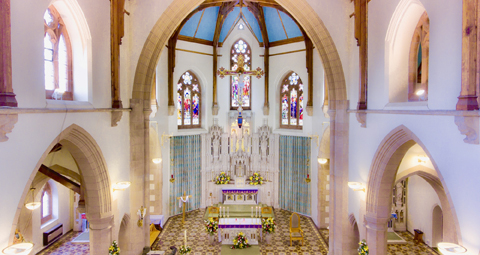August 30 | ![]() 0 COMMENTS
0 COMMENTS ![]() print
print

Our churches must be places fit for worship
While not neglecting our duty to the poor, we should ensure that our church buildings are beautifully adorned as a house fit for God, Fr Michael Kane writes.
In my last column I had been writing about our final preparations for the diaconate ordination of David Harper. Thanks be to God he was ordained last Thursday in an uplifting celebration which brought much joy and excitement to our parish. I am also delighted that Bishop Joseph Toal has decided that Deacon David should stay with us at St Augustine’s as he begins his ministry.
Looking back at the Ordination Mass there is much that could be said of the beauty of the solemn liturgy: the Prayer of Consecration, the laying on of hands, the litany of Saints, the hymns and beautiful Latin Mass setting. The words, both sung and spoken, helped to raise our hearts and minds and voices to God.
The beauty of our Catholic liturgy, however, is not only found in the sacred prayers and hymns that we hear. It’s a much more sensory affair. In fact, so much of the richness of our liturgy is found in what we see with our eyes.
Worship of God
This is why it’s so important that our churches are places that are beautifully adorned and richly decorated. These things signal that we are willing to offer the very best we can in the worship of God and it resonates with the biblical image that the divine liturgy is a foretaste and promise of the heavenly liturgy.
This desire to give God what is best originates in a proper understanding of the first and most important function of the Church: to show our love for God in the liturgy. Before every other act of charity, worship of God is the first and most important function of the Church.
Every other act of love, however noble, is secondary to the worship of God. For this reason God deserves the best we can offer him, and our churches should rightly be places of rich beauty, sanctuaries of peace and Houses of God.
Beautifully furnished
In concrete terms this means ensuring our churches are furnished beautifully with noble materials, beautiful altars, images and statues, adorned with flowers and candles and enriched with the finest linen and vessels.
They should be spotlessly clean and tidy and be places which observe a sacred silence conducive to prayer. It also means our sacristies should contain vestments of noble quality for use in the sacred liturgy, according to our means.
In this way we signal to the world, so often mesmerised by the mundane and ugly, that God’s House is of unparalleled importance to the Christian family.
Problem of priorities
The environment of our churches speaks a language of priorities. If they lack those things which are worthy and precious, then it signals a problem of priorities.
Worse still, if our homes contain items more worthy or beautiful than our churches, then God has become lost to a different type of self-worship. Our churches should stand as places of unique importance in the midst of our communities where God, not man, is worshipped.
For this reason, our Church can still confidently preach noble simplicity and humility among her members while giving to God the very best we have. There is no hypocrisy in this. God should always come before our own earthly needs.
Lessons from our ancestors
We can learn much from the example of former generations of Catholics who knew real poverty, but who never inflicted that poverty on their church buildings. Theirs is certainly a lesson in priorities.
When poor Irish migrants came to my own parish of St Augustine’s in the late 19th century searching for a better future for their children, they never neglected God’s House. In fact, the pennies of the poor build up these magnificent churches to show that God comes first in everything.
We honour their legacy by continuing to give God the best we can, even if that means some small sacrifice along the way.
St John Vianney, the patron saint of parish priests, spoke a word of caution to his brother priests many years ago on this very topic. This poor and humble priest reminded us of our duty to give God the very best. He once wrote that ‘poverty stops at the sanctuary!’
Example to follow
Long before St John Vianney, a poor girl called Mary poured precious and expensive ointment on the feet of Jesus and wiped them with her hair. She generously gave God a lavishly expensive gift, the best she could, and she left the Church an example to follow.
Of course, our obligations to the sacred liturgy do not preclude our obligations to our brothers and sisters in need, especially the poorest. We cannot adorn our churches while ignoring the plight of others. In a world of plenty we should try our best to do both.
As for our new deacon, he will now begin his ministry serving others in our parish, but he will also step on to on the altar of our beautiful Pugin church each day in the finest vestments, because God must always come first!










